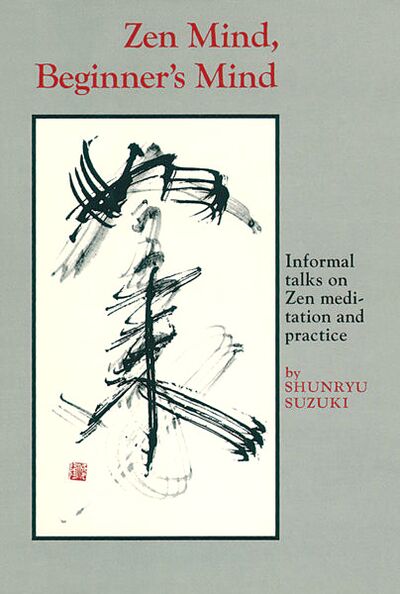|
|
| Line 2: |
Line 2: |
| |FullTextRead=No | | |FullTextRead=No |
| |BookToc=**{{i|Preface, ''by'' Huston Smith|9}} | | |BookToc=**{{i|Preface, ''by'' Huston Smith|9}} |
| **{{i|Introduction, by Richard Baker|13}} | | **{{i|Introduction, ''by'' Richard Baker|13}} |
| **{{i|Prologue: Beginner's Mind|21}} | | **{{i|Prologue: Beginner's Mind|21}} |
|
| |
|
| Line 16: |
Line 16: |
| **{{i|Nothing Special|46}} | | **{{i|Nothing Special|46}} |
|
| |
|
| *PART 2 RIGHT ATTITUDE | | *PART 2 RIGHT ATTITUDE |
| **{{i|Single-minded Way|53}} | | **{{i|Single-minded Way|53}} |
| **{{i|Repetition|55}} | | **{{i|Repetition|55}} |
| Line 32: |
Line 32: |
| **{{i|Nirvana, the Waterfall|92}} | | **{{i|Nirvana, the Waterfall|92}} |
|
| |
|
| *PART 3 RIGHT UNDERSTANDING | | *PART 3 RIGHT UNDERSTANDING |
| Traditiona
| | **{{i|Traditional Zen Spirit|99}} |
| l Ze
| | **{{i|Transiency|102}} |
| n Spiri
| | **{{i|The Quality of Being|104}} |
| t 99
| | **{{i|Naturalness|107}} |
| Transienc
| | **{{i|Emptiness|110}} |
| y 102
| | **{{i|Readiness, Mindfulness|113}} |
| Th
| | **{{i|Believing in Nothing|116}} |
| e Qualit
| | **{{i|Attachment, Non-attachment|118}} |
| y o
| | **{{i|Calmness|121}} |
| f Bein
| | **{{i|Experience, Not Philosophy|123}} |
| g 104
| | **{{i|Original Buddhism|12S}} |
| Naturalnes
| | **{{i|Beyond Consciousness|127}} |
| s 107
| | **{{i|Buddha's Enlightenment|131}} |
| Emptines
| | |
| s 110
| | **{{i|Epilogue : Zen Mind|133}} |
| Readiness | |
| , Mindfulnes | |
| s 113
| |
| Believin
| |
| g i
| |
| n Nothin
| |
| g 1 16
| |
| Attachment | |
| , Non-attachmen | |
| t iit
| |
| Calmnes
| |
| s 121
| |
| Experience | |
| , No | |
| t Philosoph
| |
| y 123
| |
| Origina
| |
| l Buddhis
| |
| m 12S
| |
| Beyon
| |
| d Consciousnes
| |
| s l27
| |
| Buddha' | |
| s Enlightenmen | |
| t 131
| |
| Epilogu
| |
| e : Ze
| |
| n Min
| |
| d 133
| |
| |AddRelatedTab=No | | |AddRelatedTab=No |
| |StopPersonRedirects=No | | |StopPersonRedirects=No |
| }} | | }} |

